Although France was relatively quick to respond to the COVID-19 pandemic, the country has been hit hard by the virus in terms of both public health and the economy. Indeed, the country has seen over 100,000 deaths from coronavirus. However, 2021’s vaccination roll-out has been largely successful and the French economy is showing signs of recovery following the easing of restrictions.
If you live in France – or are planning to relocate – knowing the latest restrictions and regulations regarding COVID is essential. To help you stay on top of an ever-changing situation, this guide provides information on the following:
- Overview of COVID-19 in France
- Coronavirus rules and measures in France
- Apps for COVID-19 in France
- COVID-19 passport or pass sanitaire
- Coronavirus testing in France
- COVID-19 vaccinations in France
- International travel during COVID-19 in France
- Long COVID support in France
- COVID-19 support for businesses, self-employed, and freelancers in France
- Impact of COVID-19 on education in France
- COVID-19 support for vulnerable people in France
Cigna Global
Enjoy peace of mind while living in France with Cigna Global’s long-term international health insurance plans (12+ months). Get tailored coverage, direct billing with many providers, complex case management, and global care on demand, with access to a network of 1.5+ million doctors, specialists, and therapists.
Overview of COVID-19 in France
Since the early days of the pandemic, France has been among the worst-hit countries in terms of total COVID-19 cases and deaths. However, the French government responded with some of the tightest restrictions in Europe, as well as wide-reaching testing and vaccination programs.
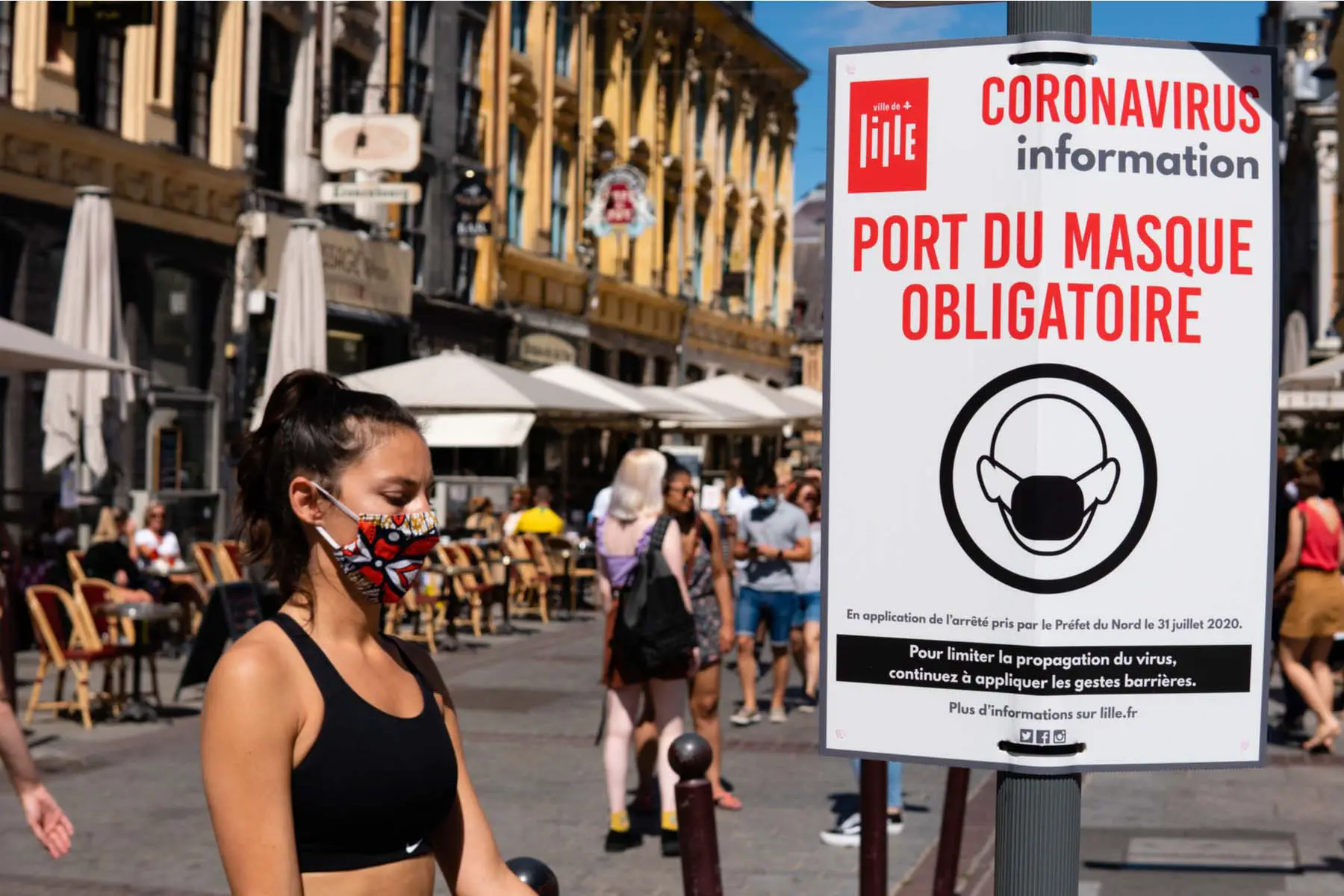
The Ministry of Health and Solidarity is leading the fight against the coronavirus pandemic in France. Their website is a great source of information regarding the virus. It publishes daily statistics on its interactive platform, giving an overview of cases, deaths and vaccination rates across the country.
Coronavirus rules and measures in France
France first went into lockdown in March 2020, with restrictions lasting two months. Since then, the government has loosened and tightened restrictions depending on the spread of the virus through the country and the number of cases and hospital admissions. These restrictions have included curfews, border controls, social distancing, and face mask requirements. Alongside the national vaccination program, the French government has also introduced the pass sanitaire. This is essentially a QR code pass that allows citizens to access various services and establishments.
The COVID-19 restrictions have seen vocal opposition from certain sections of society. Indeed, anti-lockdown demonstrations have been common in France, as well as some citizens resisting certain coronavirus measures. One of the most controversial moves was the introduction of the pass sanitaire. This saw the most virulent protests, with many people considering the measure an infringement on personal freedoms.
Government rules concerning COVID-19 measures change frequently, and the most up-to-date information is on the official government COVID-19 website. For the latest advice on what to do if you have COVID-19 symptoms, on tests, self-isolation, vaccinations, travel guidelines, and the pass sanitaire, visit Mes Conseils Covid. To find your nearest testing center, visit Santé.fr.
Apps for COVID-19 in France
The French government launched the TousAntiCovid tracing app in October 2020. It communicates directly with GPs and the state health insurance system (l’Assurance Maladie). You can also access the digital version of your pass sanitaire through the app.
COVID-19 passport or pass sanitaire
The pass sanitaire is the equivalent of the EU Digital Covid certificate, required for everyone aged 12 and above. It includes a QR code that you’ll need to access certain public venues and long-distance forms of transportation. You can either use a print-out version, or, more commonly, a digital version through the TousAntiCovid app.
If you were vaccinated abroad, your digital certificate may not be accepted in France. This depends on where you were vaccinated. For example, if you were vaccinated outside of Europe you will need to apply to convert your certificate and obtain a French pass sanitaire. The Ministry of Foreign Affairs has set up an online procedure for this through demarches-simplifiees.fr.
For more information, visit the France Diplomacy website.
Coronavirus testing in France
At the start of the pandemic, all testing in France was free. However, since July 2021, non-resident foreigners must pay for their test unless they have a medical prescription or are a contact case.
As of mid-October 2021, even French residents will have to pay for testing. Nevertheless, there are notable exceptions to this, and testing remains free if you have a medical prescription or if you are a contact case, for example.
Three types of COVID tests are available in France: virologique (PCR tests), antigénique (antigenic tests) and sérolgique (antibody tests). You can find testing sites near you on Santé.fr. For the latest information concerning testing for COVID, visit the French Health Ministry website.
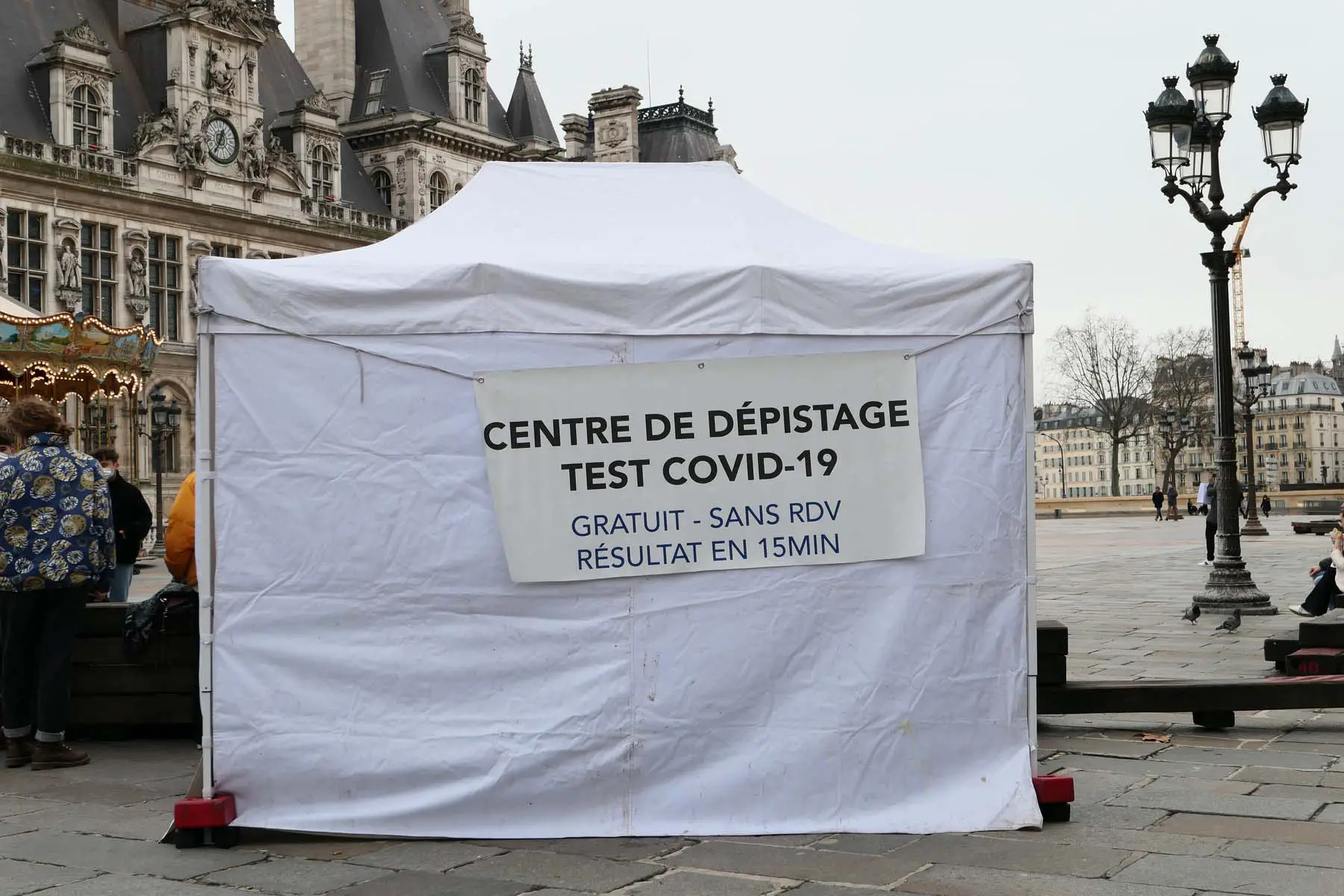
PCR Tests
If you get a PCR test in France, it can be through the nasal cavity or by mouth swab. Be aware that parents must give their permission for children to get saliva tests in schools. Results are generally available within 24 hours. In addition to lab testing, some places offer drive-thru PCR testing so you don’t even need to get out of your car.
Antibody tests
The antibody test, known as test sérologique, is a blood test that tests for antibodies, not contagion. You will get results within 24 hours. Antibody tests are mostly done in labs (laboratoire d’anamyses médicales), so contact one near you if this is what you need. Some pharmacies may also offer fast antibody testing with results in a few minutes. These tests are called TROD (tests rapide d’orientation diagnostique). When traveling, certain countries may require you to have both a negative PCR and antibody test to enter.
Antigenic tests
A pharmacist, doctor, or nurse can administer an antigenic test with a nasal cavity swab. They can be used at a patient’s house, and even done by the patient themselves under supervision. They test whether the patient is carrying the Covid-19 virus. You’ll get results in less than 30 minutes.
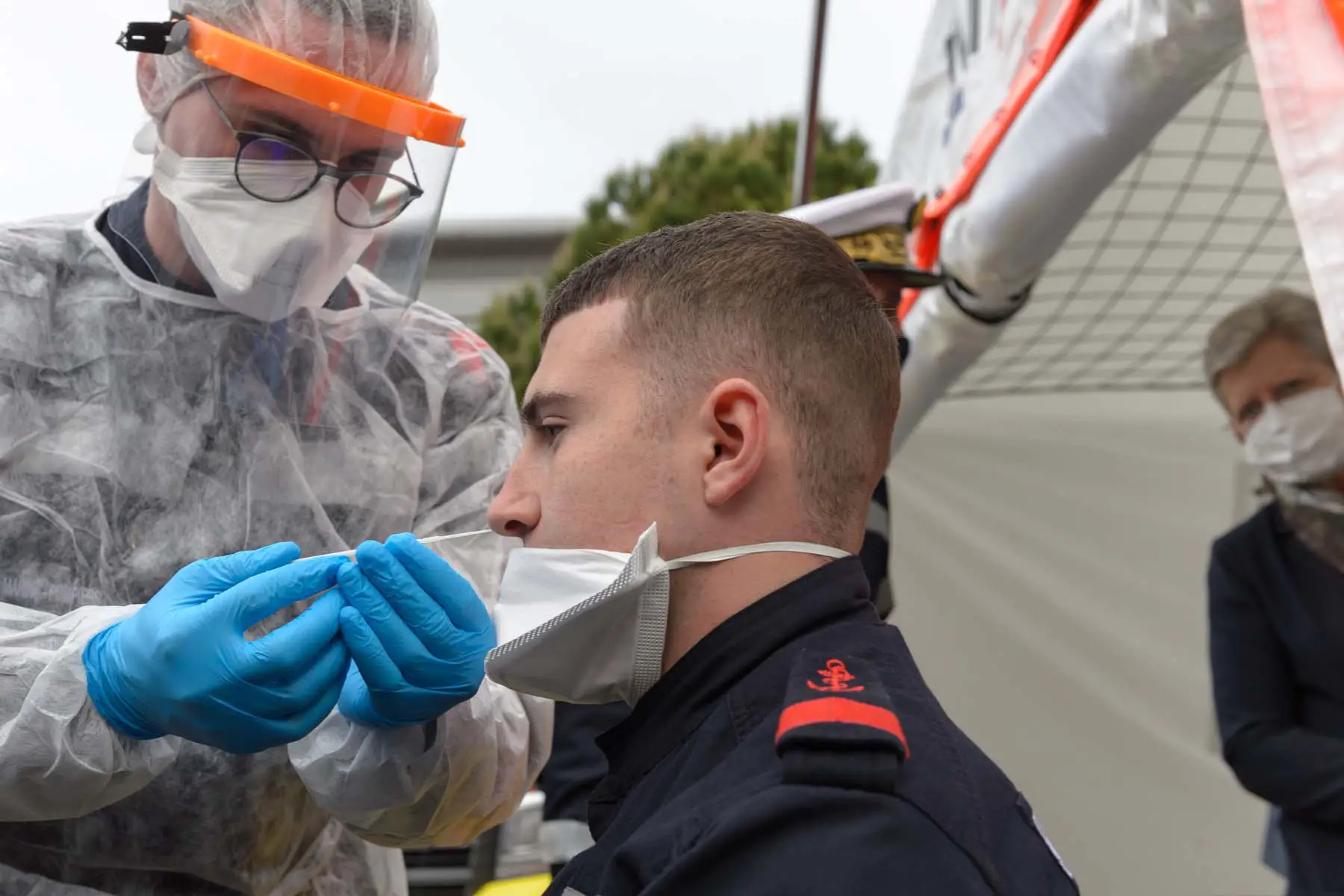
If you test positive for COVID-19 in France
If you test positive for coronavirus in France, you must self-isolate for 10 days. Any members of your household will have to isolate if they are not vaccinated. This includes children, who should not go to school. You should then take an antigenic test regardless.
After 10 days you can come out of isolation, providing you have had no symptoms for 48 hours. No test is required. However, should your condition deteriorate during these 10 days, you should contact your doctor or call the national information line. For the latest information, visit the Health Ministry’s Mes Conseils Covid website.
COVID-19 vaccinations in France
As of September 2021, 75% of French residents have received at least one dose of the vaccine. An average of around 34,000 people is getting a vaccine each day. At this rate, the entire population of France could be vaccinated by March 2022. However, according to Our World in Data, a significant percentage of French people do not want to get a vaccine.
You can find up-to-date statistics on COVID vaccination rates on the French Covid Tracker website. Alternatively, for extensive data on vaccination in France, see data.gouv.fr.
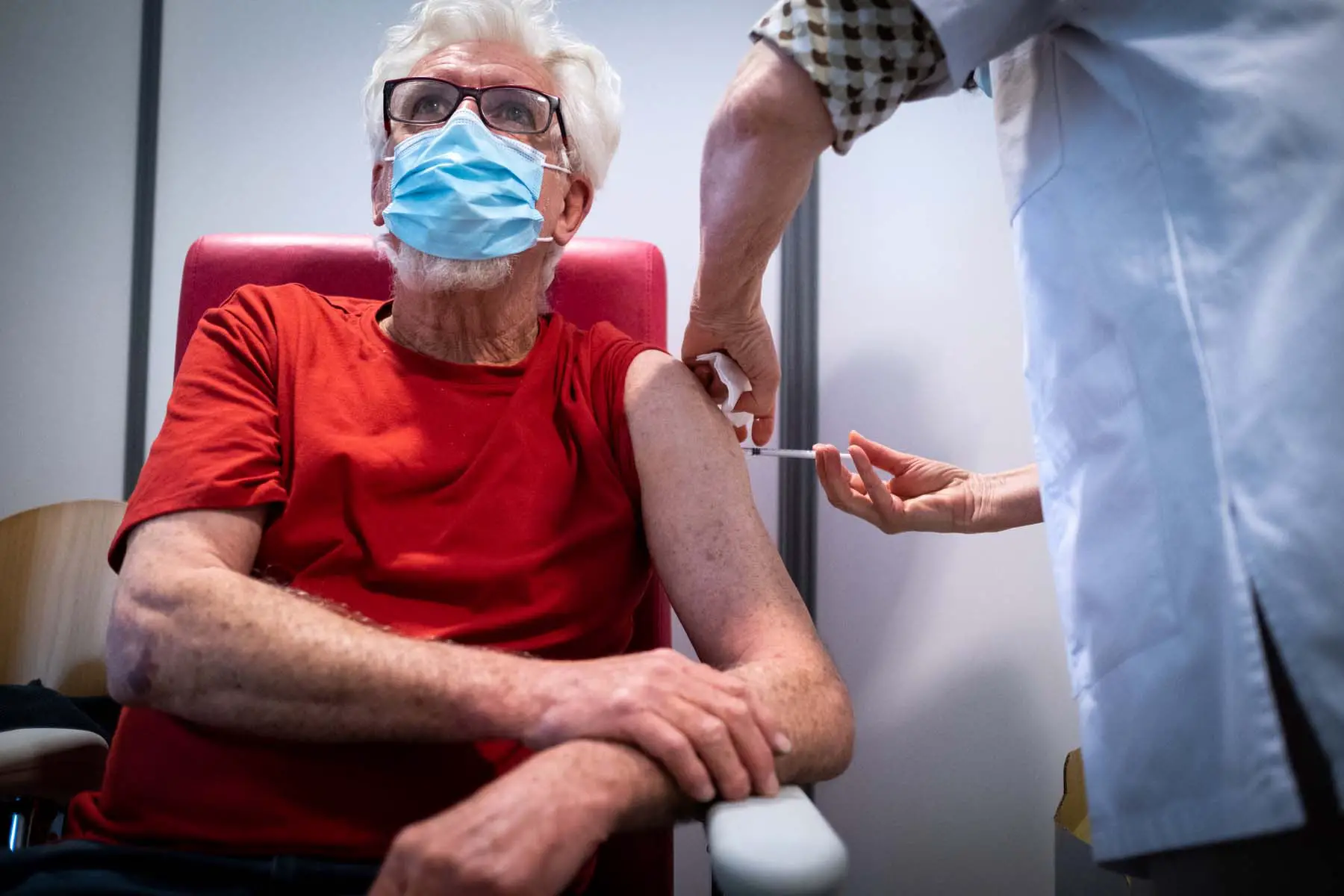
Vaccination centers in France offer the Pfizer-BioNTech vaccine for people aged 12 and above. The Moderna vaccine is also available from local doctors’ practices for patients aged 12 and above. Those aged 55 and above can also get the AstraZeneca and Janssen vaccines.
If you need to get vaccinated, you can find a vaccination point near you on the Santé.fr website. There is also a section on the Covid Tracker website called ViteMaDose to help you find a slot as soon as possible.
International travel during COVID-19 in France
International travel restrictions to and from France during the COVID-19 pandemic will largely depend on your country of origin/destination, and your vaccination status. Therefore, it pays to do your research well ahead of time. For country-specific information, the France Diplomacy website has useful guidelines.
Generally speaking, travelers from an increasing number of countries can enter France by showing proof of vaccination. For example, residents of other EU countries can show their QR code from their home country as proof. For travelers from further afield, the process will depend on your country of origin. If you are not vaccinated, you may need to provide proof of a negative PCR test. You can see which countries are on the green, orange, and red lists and check all the latest requirements on the France Diplomacy website.
Long COVID support in France
If you have Long COVID symptoms, your GP (médecin traitant) should be your first port of call. They may prescribe additional tests to identify the most relevant treatment or put you in touch with a specialist. In addition, a doctor may orient you towards a post-COVID center if your case is more complex.
The Haute Autorité de Santé has extensive information about Long COVID’s symptoms and proposed treatments. This organization estimates that 10% of COVID-19 patients experience symptoms over six months after contracting the disease. This figure goes up to 80% for hospitalized patients.
If you suffer from Long COVID and are looking for support, check out the Survivor Corps international support group. Similarly, the French associations Après J20 and TousPartenairesCovid can provide information and advice.
For the time being, there is little official information about Long COVID in children. For the families of the hundreds of children affected in France, a Facebook support group is available. In addition, the Long COVID Kids website and support groups have plenty of data, statistics, and links to research in English.
COVID-19 support for businesses, self-employed, and freelancers in France
For small businesses and freelancers, known as auto-entrepreneur or micro-entrepreneur, the French government provided subsidies for lost earnings during lockdowns. Certain financial support measures remain in place to support the economy.
For instance, if you own a small business or run an association affected by health restrictions, you may benefit from financial support. Similarly, if you have experienced a loss of income as a freelancer due to the pandemic, contact URSSAF to see what benefits you can access. While URSSAF’s website has a wealth of information, it’s often easier to call them for personalized advice.
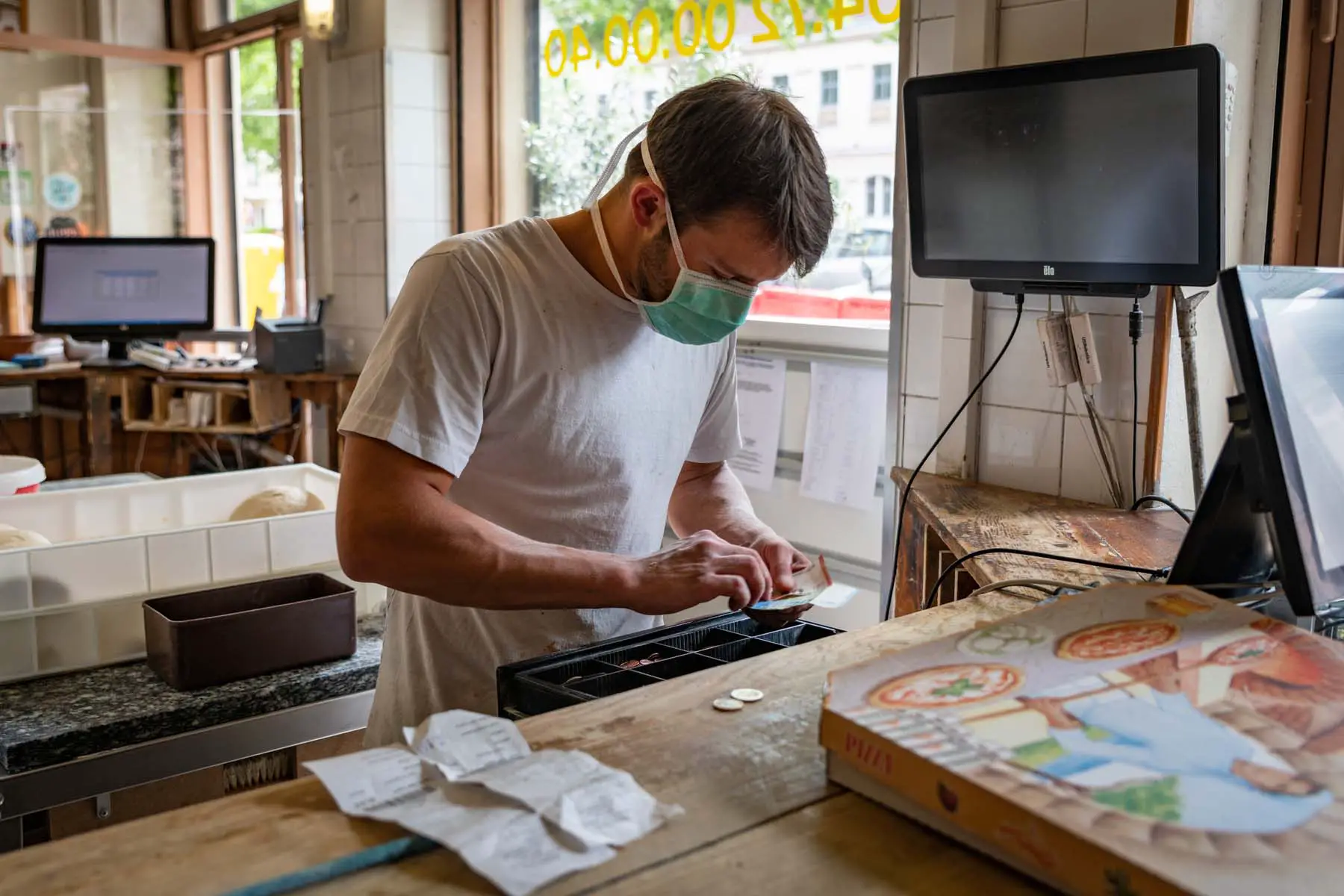
Additionally, visit the French government’s website to see a helpful summary of information related to the epidemic and support for workers and businesses in various fields.
INSEE, the National Institute of Statistics, publishes quarterly reports about the consequences of COVID-19 on the French economy. In 2020, France’s GDP fell by almost 8%. Despite new waves of the pandemic, France’s economy is slowly recovering. This is likely due to widespread vaccinations, reduced hospitalizations, and the re-opening of commercial and cultural spaces.
Helpfully, INSEE also provides interactive graphs that will help you visualize the country’s economic situation.
Impact of COVID-19 on education in France
The government initially shut schools and universities for a few months during the first lockdown in March 2020. However, these reopened during the 2020–2021 academic year. Since then, classes are periodically closed only if positive cases are detected among students. Nonetheless, much university-level teaching still takes place remotely.
The French government aims to avoid school closures as much as possible. Schools continue to apply some social distancing measures including masks for staff and children over six (from primary school up). In addition, parents give their consent for coronavirus testing on all school pupils in France.
The Education Ministry shares the most up-to-date information on its website. There is also an extensive Q&A on this topic. Moreover, the French government promotes vaccination for all children aged 12 and above.
The Ministry of Health and Solidarity has also made resources available and is offering support for families with children of all ages to help them cope during the pandemic.
For information and support for university students during COVID-19, the Ministry of Higher Education website is your first port of call. However, each individual university and faculty will communicate the latest guidelines and recommendations to its students.
COVID-19 support for vulnerable people in France
People with disabled family members can use a dedicated COVID-19 online platform called Solidarités Handicap. It gives information about local initiatives to help with childcare, educational and psychological support.
The elderly and vulnerable can contact the Red Cross at 09 70 28 30 00. There is also a delivery service that helps people get access to medicines and other essentials.
Furthermore, the Ministry of Health and Solidarity has a list of resources for isolated elderly people and their helpers. Various groups and associations encourage neighbors to embrace solidarity during the pandemic, so it’s worth seeing how you can benefit or contribute.






